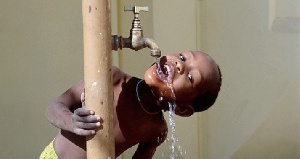 March 22 has been celebrated as World Water Day since 1993
March 22 has been celebrated as World Water Day since 1993
By: Alex Blege
Since 1993, March 22 has been celebrated as World Water Day. The day was first officially added in the schedule 21 of the United Nations Conference on Environment and Development held in Rio de Janeiro, Brazil in 1992.
This year’s celebration focuses on, “Wastewater”. Basically, wastewater is water that has been used in the homes and businesses in ways that negatively impact its quality with high concentrations of pollutants such as human waste, oils, grease, and other harmful chemicals.
Water in general is a human rights issue. In 2010, the UN declared water as a basic human right and this makes it critical to sustainable living and survival for all.
With reference to wastewater, the third target of the Sustainable Development Goal 6 states that, “by 2030, improve water quality by reducing pollution, eliminating dumping and minimizing release of hazardous chemicals and materials, halving the proportion of untreated wastewater, and increasing recycling and safe reuse globally”.
In a media launch on March 9, the Ghana News Agency (GNA) reported that the Ghana Water Company Limited (GWCL) says less than 10% of wastewater in the country is treated and as such there’s the need for measures in prioritising recycle of wastewater to enhance socio-economic development.
This is a situation that deserves immediate attention since the total amount of grey and black wastewater produced in urban Ghana is approximately 280 million m3 as reported in a national draft policy: “Wastewater use for Agriculture in Ghana”.
In a report: “Assessment of Waste Water Treatment Plants in Ghana” authored by the Civil Engineering Department of the Kwame Nkrumah University of Science and Technology (July 2016), it’s stated that “Ghana has a very low coverage for wastewater and faecal sludge treatment which is mostly sewerage systems. The national average for sewerage is as low as 4.5%”
In spite of its prevalence in the urban areas of Ghana, there’re two municipal and three metropolitan assemblies that have wastewater and faecal sludge treatment plants in Ghana – Ho and Ashaiman Municipal Assemblies and Tamale, Greater Accra and Kumasi Metropolitan Assemblies as stated in the report above.
Therefore, out of the 216 Metropolitan, Municipal and District Assemblies (MMDAs) in Ghana, there’re only five that have wastewater treatment plants. The absence of measures to treat wastewater degenerates into another problem of pollution of water bodies since wastewater is left to flow into these water bodies.
The responsibility of human settlement management is stated clearly in the Local Government Act, 1993 (462) under the Functions of District Assemblies. It states in subsection 3(e): “Without prejudice to subsections (1) and (2), a District Assembly is responsible for the development, improvement and management of human settlements and the environment in the district”.
Thus, the Ministry of Local Government and Rural Development and the various MMDAs must partner with all other relevant agencies to ensure that wastewater is treated for sustainable living and survival.
In October 2016, it was reported that plans are far ahead in decommissioning of the lavender hill in Accra where liquid and solid waste was dumped into the sea. This was after the Accra Metropolitan Assembly had failed to address the complaints from the public about the health hazards the situation posed.
There’s the need for a similar wastewater treatment plant nationwide to ensure that wastewater is treated and reused to enhance sustainable living and survival. In recent times, water is becoming a scarce resource as a consequence of large population, illegal logging and mining and, poor agricultural practices.
A famous resource economist, Erich Walter Zimmerman once stated: “resources are not, they become”. This emphasises the identification of wastewater as a resource that must be recycled and reused for sustainable living and survival for all.
For as the famous Nigerian Afro beat musician, Fela Kuti sung: “water no get enemy”